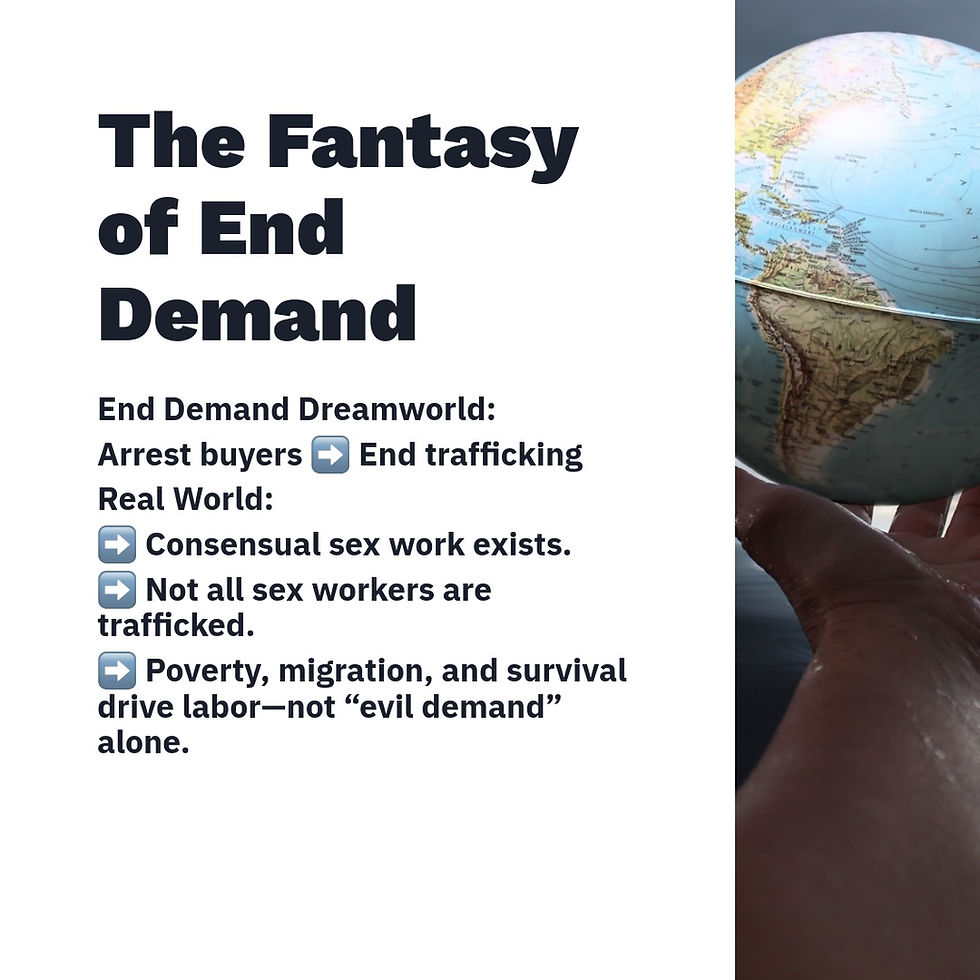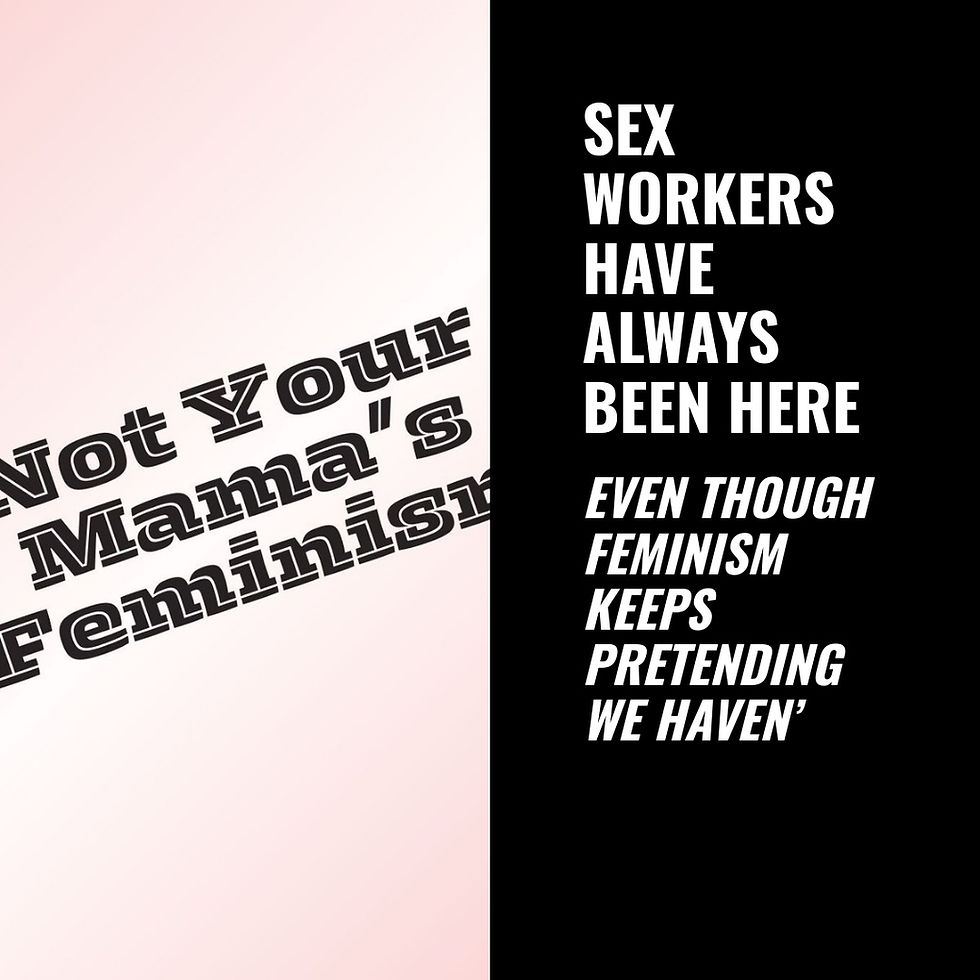Economic Basics: Supply, Demand, Tariffs, and the Sex Trade
- Swop Behind Bars

- May 8, 2025
- 5 min read
Updated: May 12, 2025

Supply and demand determine the price of goods and services. This is just a fact—and facts matter. High demand or low supply raises prices; low demand or high supply lowers them. Tariffs—taxes on imports—disrupt this balance by artificially increasing the cost of goods and services.
This basic principle of economics has been proven true since the dawn of time. Yet somehow, it remains an inconvenient truth for End Demand supporters and all their ideological reboots—the Nordic Model, Swedish Model, Equality Model, whatever they're branding it this week.
End Demand theory tries to twist a solid economic principle into a convoluted "Advanced Yoga Pretzel Pose" in order to sell the idea that criminalizing certain parts of the sex trade will magically solve human trafficking. Spoiler: It won’t.Sure, it sounds great on the surface. Survivors and sex workers agree that not being arrested is a plus. But coming after our clients—under the guise of "protecting children" and "ending trafficking"—isn’t a solution. It's about as logical as banning forks to cure obesity.
Why Does the End Demand Lobby Think Arresting "Buyers" Will Reduce Trafficking?

The End Demand movement hinges on a simple (and deeply flawed) assumption:
Eliminate demand for commercial sex, and there will be no incentive for traffickers to supply victims.
Therefore, arresting buyers—the "demand"—will supposedly dry up the market and end trafficking.
It’s the kind of idea that looks cute on a PowerPoint slide—or fits neatly on a canvas tote bag handed out at an anti-trafficking fundraiser. But like most things that fit on a tote bag, it completely collapses under real-world scrutiny.
Where Does End Demand Logic Fall Apart?

The fantasy of End Demand policies disintegrates the second you step outside the bubble of church basements, curated TED Talks, and sanitized nonprofit conferences.
In the real world, consensual adult sex work exists. Not all individuals involved in the sex trade are trafficked—indeed, the majority are not. People engage in the sale of sexual services for the same reasons they engage in any form of labor: survival, opportunity, and yes, sometimes even personal choice.
When you lazily lump all sex work into trafficking, you don’t "protect" anyone. You erase the agency of sex workers and bury the real, complicated experiences of trafficking victims under a giant mountain of moral panic.
You cannot end trafficking by refusing to understand the very people you claim to be fighting for.
When Does It Fall Apart?

The whole house of cards falls the moment criminalizing buyers is mistaken for a solution.
Sex work doesn’t disappear under End Demand models. It simply moves into darker, more dangerous corners. Workers lose the ability to screen clients. Negotiations get rushed. Violence escalates.
And the ability to report crimes to police? Forget it. Under End Demand, calling for help often means risking your own arrest—or worse.
You do not earn a humanitarian gold star by making survival more dangerous. You just get blood on your hands.
Every policy decision carries consequences—and "good intentions" are not a magic eraser for harm when the outcomes are deadly.
How Does It Fall Apart?

End Demand approaches rely on a fundamentally lazy shortcut: the assumption that if you tackle "demand," you automatically tackle trafficking.
This dangerously simplistic thinking ignores the real drivers of exploitation: poverty, displacement, domestic violence, immigration barriers, systemic racism, transphobia, misogyny, and capitalism itself.
Traffickers don't flourish just because "buyers" exist. They flourish because systems of vulnerability exist—and predators are more than happy to exploit them.
Arresting a few lonely men in sting operations won't dismantle trafficking networks. It won't even dent them. It will only allow you to feel self-righteous while the real machinery of exploitation keeps grinding along, untouched.
Why Does It Fall Apart?
Because at its core, End Demand isn’t about ending trafficking. It’s about controlling sexuality. It’s about policing marginalized communities. It’s about criminalizing survival.
If policymakers truly wanted to end human trafficking, they would be focusing on:
Securing affordable housing,
Expanding healthcare access,
Reforming immigration laws,
Creating living-wage jobs,
Protecting survivors without criminalizing them.
But real solutions require courage, humility, and a willingness to engage with systemic injustice. Instead, End Demand supporters settle for the easier path: wrapping their discomfort with sex, poverty, and personal agency in a shiny "save the victims" narrative.
And make no mistake: it is sex workers and actual trafficking survivors who pay the price for this cowardice.
The Breathtaking "Magic Wand " of End Demand (And Its Fairy Dust Cousin: Tariffs)

Ah yes, the breathtaking "magic wand" of End Demand initiatives—where policymakers genuinely believe that if you just criminalize enough poor people and shame enough buyers, centuries of human behavior will vanish overnight.
Brilliant strategy: ignore poverty, migration, systemic inequality, and every shred of actual evidence, and instead just handcuff your way to utopia. Truly groundbreaking stuff.
And because that’s working so well, why not sprinkle the same fairy dust on global trade?
Enter tariffs—the equally genius idea that if you jack up prices and throw enough wrenches into the economy, supply and demand will just...shrug and disappear. Same tired delusion, just dressed in a different outfit.
The belief that if you make life miserable enough, people will somehow stop needing, wanting, or surviving? Spoiler alert: they won't. They'll just find riskier, more desperate ways to get what they need—while you stand around congratulating yourself for "sending a message."
How Tariffs Expose the Bullshit Behind End Demand
Tariffs expose a brutal truth about markets: you cannot simply ban, tax, or punish your way out of supply and demand.
When governments slap tariffs on imported goods, their goal is often to "protect" domestic industries or "shift" consumer behavior. But here’s what actually happens:
Prices go up.
Consumers look for alternatives—or pay more.
Black markets pop up.
Industries adapt—but often become lazier, more exploitative, or more dangerous.
Even the most aggressive tariffs don’t erase demand. They just mutate it. They shift it. They drive it into new, sometimes riskier, channels.
Now apply that same reality to the sex trade.
End Demand supporters argue that if you arrest or shame buyers, demand for sexual services will disappear. But basic economic principles—and literally every tariff example in modern history—prove otherwise:
Suppression increases risk but doesn't eliminate demand.
Markets adapt—usually harming the most vulnerable first.
Higher barriers often just mean higher prices—not less activity.
Underground economies thrive under prohibition, not shrink.
When you "tariff" the sex trade by criminalizing buyers, shutting down platforms, or flooding the streets with police, you don’t end trafficking or sex work. You drive it deeper underground.You make it more dangerous.You empower predators willing to operate in riskier, less visible spaces. If tariffs can't erase the consumer demand for steel, eggs, avocados, or iPhones, what makes anyone think they can erase human demand for sex?
Bottom Line

You cannot arrest your way to freedom.You cannot criminalize your way to safety.And you cannot fix a broken system by pretending the only problem is a few bad actors trying to purchase sexual services.
If you are serious about ending trafficking, stop criminalizing survival. Start dismantling the conditions that make exploitation possible.
And maybe—just maybe—put down the tote bags, skip the self-congratulatory press conferences, and actually listen to the people whose lives you keep claiming you want to "save." Because right now, End Demand policies aren’t rescuing survivors. They're just rescuing your own moral vanity—and leaving the rest of us to clean up the mess.
Want to support SWOP Behind Bars as we work to reduce exploitation and violence through community based programs and projects?




Comments